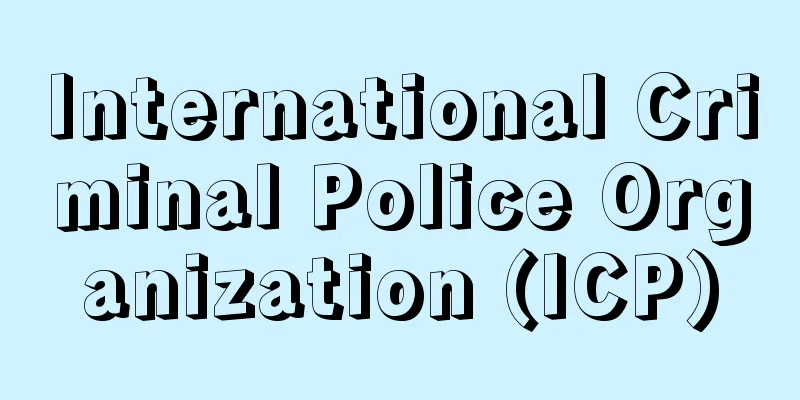International Criminal Police Organization (ICP)

|
Abbreviation: ICPO. An international administrative-level organization, also known as INTERPOL, whose purpose is to exchange information and cooperate in investigations regarding international crimes between police forces in various countries. It began with the first International Criminal Police Congress (1914, Monaco) before World War I, and the seven participating countries at the second conference (1923, Vienna) established the International Criminal Police Commission as a permanent organization, but in 1956 it changed to its current name and organization. Its headquarters moved from Saint-Cloud, France, to Lyon in 1988. Its internal organizations are composed of a general assembly, an executive committee, and an international central secretariat, and each member state has a national central secretariat (Japan's is within the National Police Agency). The ICPO aims to cooperate on many fronts, while respecting national sovereignty and the differences in the domestic police organizations of each country. In particular, it (1) exchanges information through a standing communication system between national central secretariats, checks suspected facts, distributes wanted posters, and handles extraditions; (2) participates in the drafting of criminal treaties (the Convention against Counterfeiting of Currency, the Single Convention on Narcotic Drugs, the Tokyo Convention on Crime on Board Aircraft, the Hague Convention for the Suppression of Unlawful Seizure of Aircraft, the European Extradition Convention, the European Convention on Road Traffic Crime, etc.); and (3) cooperates with various international organizations (the United Nations Economic and Social Council, the International Civil Aviation Organization, the International Telecommunication Union, the World Health Organization, etc.). The ICPO was not established by a formal fundamental treaty, and the UN Economic and Social Council initially treated it as a private organization with consultative status, but since 1982 it has been considered an intergovernmental organization in relation to the UN. There are 188 member countries and regions (2009), and Japan joined in 1952. [Yamamoto Soji] [Reference] |Source: Shogakukan Encyclopedia Nipponica About Encyclopedia Nipponica Information | Legend |
|
略称ICPO。国際犯罪について各国警察間の情報交換と捜査協力を目的とする行政レベルの国際機構で、インターポール(INTERPOL)ともよばれる。第一次世界大戦前の第1回国際刑事警察会議(1914、モナコ)に始まり、第2回同会議(1923、ウィーン)の参加7か国が常設機関として国際刑事警察委員会を設立したが、1956年に現在の名称と組織に改められた。本部はフランスのサン・クルーから1988年にリヨンに移った。内部機関は総会、執行委員会、国際中央事務局から構成され、各加盟国には国家中央事務局(日本は警察庁内)が置かれる。国家主権の尊重、各国の国内警察機構の相違を前提とした多辺的な協力を目ざし、とくに、(1)国家中央事務局相互間の常備通信組織による情報交換、被疑事実の照合、犯人手配書の配付、犯罪人引渡しの処理、(2)刑事関係諸条約の起草への参加(通貨偽造防止条約、麻薬単一条約、機上犯罪に関する東京条約、航空機不法奪取の防止に関するハーグ条約、欧州犯罪人引渡条約、欧州道路交通犯罪条約など)、(3)各国際機関との協力(国連経済社会理事会、国際民間航空機関、国際電気通信連合、世界保健機関などとの協力)を行う。ICPOは、正規の基本条約による設立ではなく、国連経済社会理事会も当初は諮問的資格をもつ民間団体として扱ったが、1982年以降は国連との関係では政府間国際機関とみなしている。加盟国は188か国・地域(2009)で、日本は1952年(昭和27)に加盟した。 [山本草二] [参照項目] |出典 小学館 日本大百科全書(ニッポニカ)日本大百科全書(ニッポニカ)について 情報 | 凡例 |
<<: International Criminal Court
>>: International Economic Law
Recommend
Potala Palace - Po-ta-la
The Chinese translation is Potala Palace. The pal...
Chari River (English spelling)
A river that flows through central Africa. It orig...
"Ohanchoemon" - Ohanchoemon
...Written by Suga Sensuke. Commonly known as &qu...
"Theatre and its double" - Engeki to sono bunshin
...Theatrical philosophy brought about by French ...
Giant oil bat - Great oil bat
...Its main natural enemy is the domestic cat. Th...
Gershenkron, A. - Gershenkron
… In recent years, Walt Whitman Rostow (1916- ) i...
Isawa [town] - Isawa
An old town in Higashiyatsushiro District, Yamanas...
Sonoluminescence - Otoluminescence
Luminescence caused by sound stimulation. The phen...
Coaxial cable - doujiku ke buru (English spelling) coaxial cable
It is an unbalanced communication cable that has ...
Opening (fishing) - Kaikou
...In coastal fishing or coastal fishing, when pe...
Assotsiatsiya sovremennykh muzykantov
… [Ichiro Hariu] [music] In the 1930s, the creati...
bromide paper
...When this type of photographic paper was first...
Marigold
An annual plant of the Asteraceae family native to...
LRCS - LRCS
League of Red Cross Societies . Founded in 1919 as...
Inertial confinement fusion reactor
...In particular, the toroidal coils of a Tokamak...









